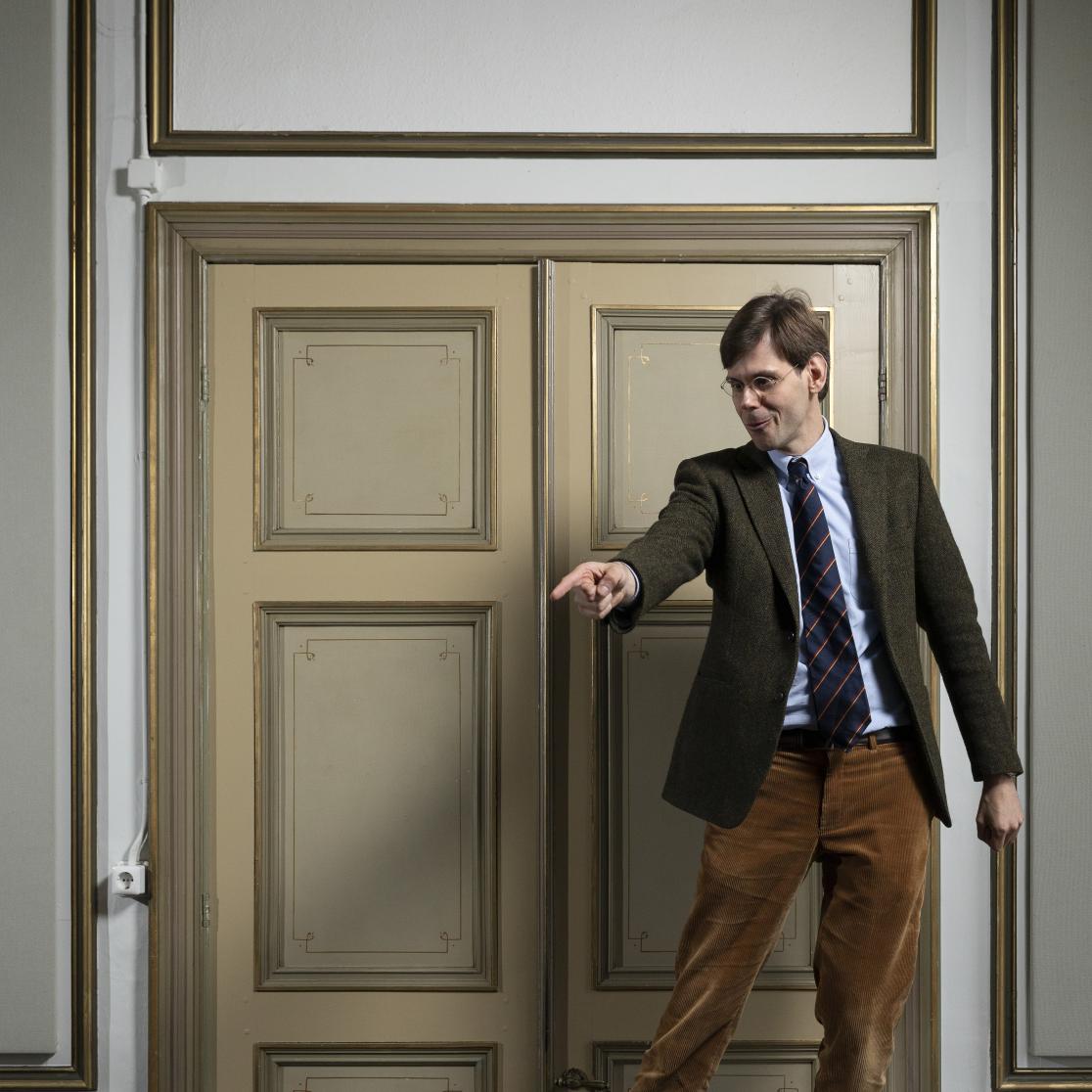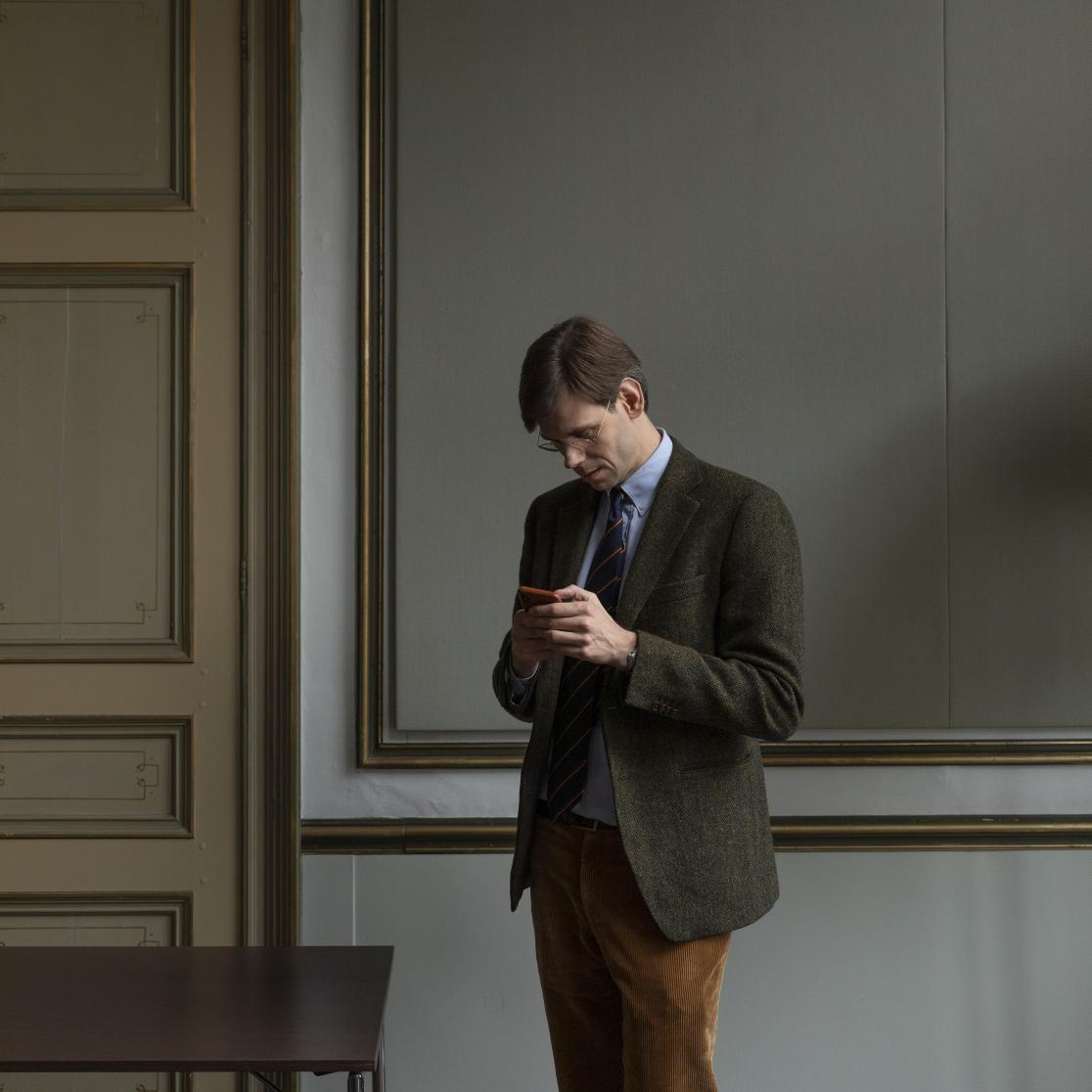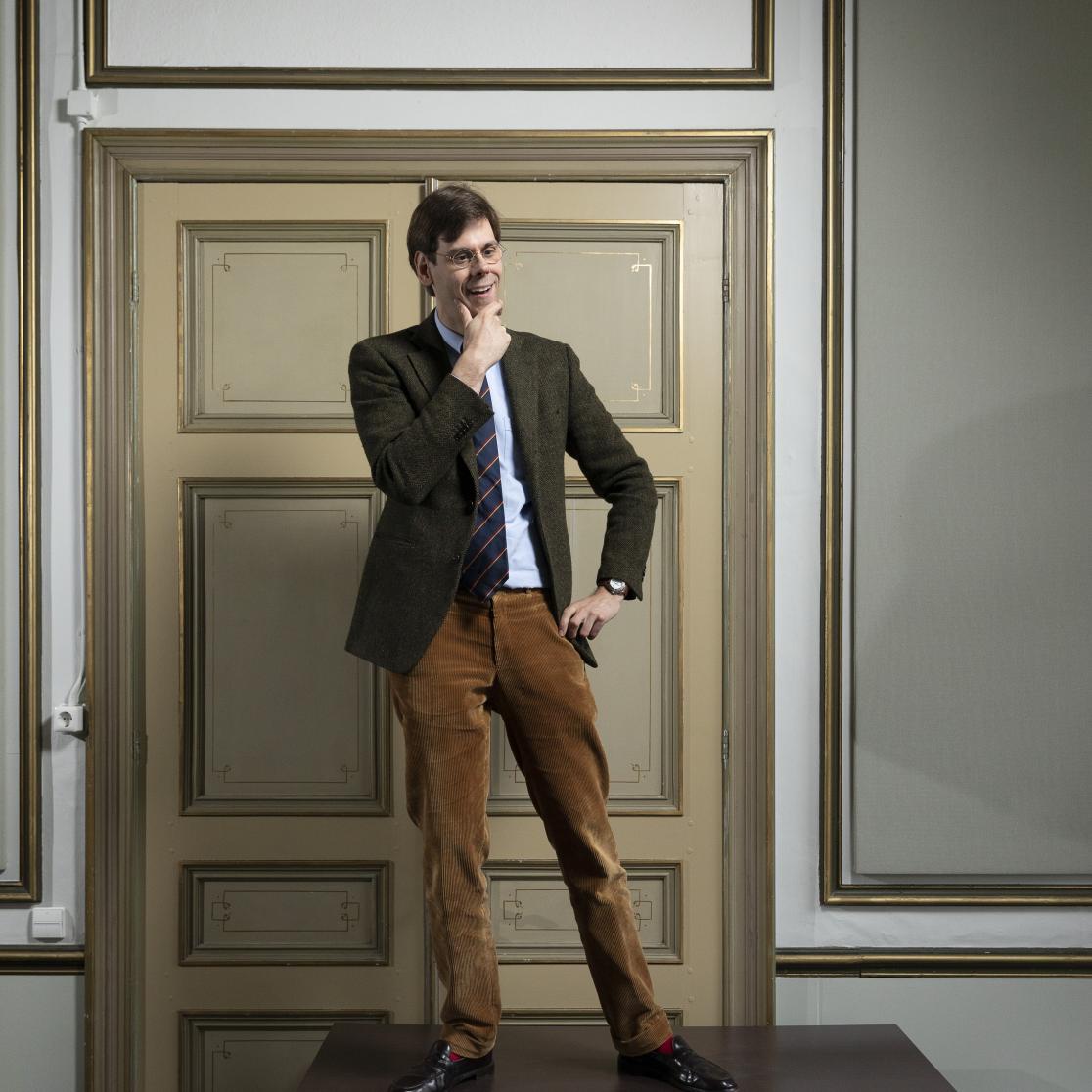“The only role I can play is myself”
When he was 12, Teun Dekker thought he was the only person he needed. He had to: the other children didn’t understand him, and nor did his teachers. But since 2007 he’s been a fish in water at University College Maastricht (UCM), as the teacher his younger self would have liked to have had. To him, teaching is a form of theatre. The political philosopher and first professor of Liberal Arts and Sciences Education in Europe turns every lecture into a performance. The goal: reaching his students. “There’s nothing better than giving them that very last hint and seeing everything click into place.”
Dekker gave his inaugural lecture in late January, making an impassioned plea for Liberal Arts and Sciences education. He isn’t alone in his enthusiasm. The Keuzegids and Elsevier rank UCM in first place on the list of liberal arts and sciences programmes in the Netherlands. And according to Elsevier, UCM has the best tutors in the country.
Dekker is undoubtedly one of them. Having attended University College Utrecht himself, he has internalised the underlying philosophy. “Liberal arts as a European movement began when I was studying there. Over the last 20 years it has become the sixth or seventh largest study programme in the Netherlands.” He is convinced of the added value of the ‘personal and relational’ form of education that helps UCM students become nuanced thinkers and better citizens. “Community spirit is very important at UCM; people learn from people.
The question I ask myself as a professor is: what is the purpose of higher education? I believe in preparing students not only for a job, but also for citizenship. That way, they’ll take on a role of responsibility in society, not just within a company or organisation. The goal of the political process today is getting your own way, rather than finding a solution together. That’s not democracy. A broad-based education alongside people from all over the world teaches students how to deal with differences in a constructive way.”
The discovery of heaven
His father worked at Rabobank, which meant Dekker spent his primary school years in the US and Italy as well as the Netherlands. When he was 8 the family moved from New York to the Dutch village of Bennekom. He felt disconnected, and not just because his English was better than his Dutch and not everyone knew who Frank Sinatra was. “I may have been the smartest boy in class, but I was also the weirdest. I was the only kid in Bennekom interested in philosophy, art and literature, the only one with a science kit. I felt less out of place in the US because they already had programmes for ‘gifted’ kids, for lack of a less obnoxious word.”
Teun Dekker (1980) graduated summa cum laude from University College Utrecht and obtained his master’s and PhD from St Antony’s College at Oxford. He then took up a postdoc position at Yale. His research focuses on the distribution of wealth; for example, funded by a Veni grant he studied top earners in the public sector in various countries. Dekker has worked at University College Maastricht since 2007. He is vice dean for Academic Affairs and, since 2017, professor of Liberal Arts and Sciences.The title of his inaugural lecture is ‘The seven democratic virtues of Liberal Arts and Sciences education’.
He felt valued by his family, and so wasn’t much bothered that people at school didn’t understand him. “I had myself, which was enough.” And then, at age 12, he read one of the major classics of Dutch post-war literature, The Discovery of Heaven by Harry Mulisch. “I devoured that book. I felt like: see, I’m not the only one. It made me realise that being smart is actually quite fun.” And that wasn’t all. He discovered Hamlet, Nabokov, Beethoven and his all-time favourite, the film Dead Poets Society. An English teacher, portrayed by Robin Williams, uses an inspiringly theatrical approach to familiarise his prep-school pupils with art and literature. Above all, he creates a special sense of community and encourages the boys to get the best out of themselves. “Wow. I wanted to be in a club with a teacher like that.”
Like-minded
Behind his desk are canvas prints of University College Utrecht, Oxford, Yale and Maastricht University – special places in Dekker’s life. UCU was where he first met like-minded people, or, as he puts it, ‘old friends who just met’. “People who were similarly serious, determined to achieve and eager to learn. People who didn’t gape at me when I said I loved Nabokov’s Pale Fire.” He graduated summa cum laude with a double major in Social Sciences and Arts & Humanities. Next stop: a master’s in political philosophy at the University of Oxford. “Oxford was the superlative of UCU. I wasn’t the only smart person there; there were people who were a lot smarter than me.” At Oxford he met the man who would become his PhD supervisor: the philosopher Gerald Cohen. “The English are well aware that politics, academia and theatre go together very well. Like me, they love ceremonies, costume parties and rituals. I love Anglo-Saxon philosophy, the theatre of structure. Only a structured way of thinking can lead to meaningful answers. I had a real click with Cohen. He was renowned as a stand-up comedian, a great performer. When lecturing he would frequently burst into song – wonderful. We often sent each other emails written as poems. It was our Dead Poets Society.”

Dekker was just 25 when he completed his PhD and took up a postdoc at Yale. “Yale is one of the greatest universities in the world, and one of the wealthiest: everything is taken care of, down to the very last detail. At the same time, there’s a lot of poverty and a lot of homelessness. At one point I found myself stepping over homeless people, in the freezing cold, to get into the library, where I would sit and write about a just society. That wasn’t what I wanted. The Netherlands is an amazing country in comparison.”
Theatre
In 2007 he joined UCM as a lecturer. He loved teaching from day one. He sees his love of theatre and his experience with school drama as major advantages. “A lecture is a performance: how do you share information so that students will remember it? How do you communicate your ideas, a structure, arguments, a certain perspective? That’s essentially what theatre is all about.” So why did he never study performing arts? “The only role I can play is myself. Above all, I try to be the teacher I would’ve liked to have had. For a certain type of student, I can approach the spirit of the Dead Poets Society. I would’ve liked to have met myself – sorry, that sounds so wrong”, he laughs. “In some way, I’ll always be the boy who was misunderstood. But now I know how much fun it is to share, so I started thinking about how I can explain things so people will understand. That’s what I do now all day long. There’s nothing better than giving students that very last hint and seeing everything click into place.”
He teaches political philosophy to about 80 students per year, and mentors the same number. Fifteen of his students have ended up in political philosophy, he says with pride. “Five of them went on to the same master’s programme I did at Oxford. One of my first ever students now works at the Dutch Ministry of Health, investigating whether society should continue to pay for very expensive drugs used by only a small number of patients. That’s exactly what my field is about. How should we think about this? How should we broach this subject with patient organisations? Where’s the line? These are truly political questions that can only be solved through a very structured way of thinking.”
These days, he rarely goes to the theatre; he’s too busy with work. “But when I go to the movies, I always wonder if I can use the film in one of my classes somehow. I recently saw a documentary about a famous London hotel in which a French concierge says of his job (with a strong accent): ‘I like to be amongst happy people who are happy because I make them happy.’ That’s me.”

He teaches political philosophy to about 80 students per year, and mentors the same number. Fifteen of his students have ended up in political philosophy, he says with pride. “Five of them went on to the same master’s programme I did at Oxford. One of my first ever students now works at the Dutch Ministry of Health, investigating whether society should continue to pay for very expensive drugs used by only a small number of patients. That’s exactly what my field is about. How should we think about this? How should we broach this subject with patient organisations? Where’s the line? These are truly political questions that can only be solved through a very structured way of thinking.”
These days, he rarely goes to the theatre; he’s too busy with work. “But when I go to the movies, I always wonder if I can use the film in one of my classes somehow. I recently saw a documentary about a famous London hotel in which a French concierge says of his job (with a strong accent): ‘I like to be amongst happy people who are happy because I make them happy.’ That’s me.”
